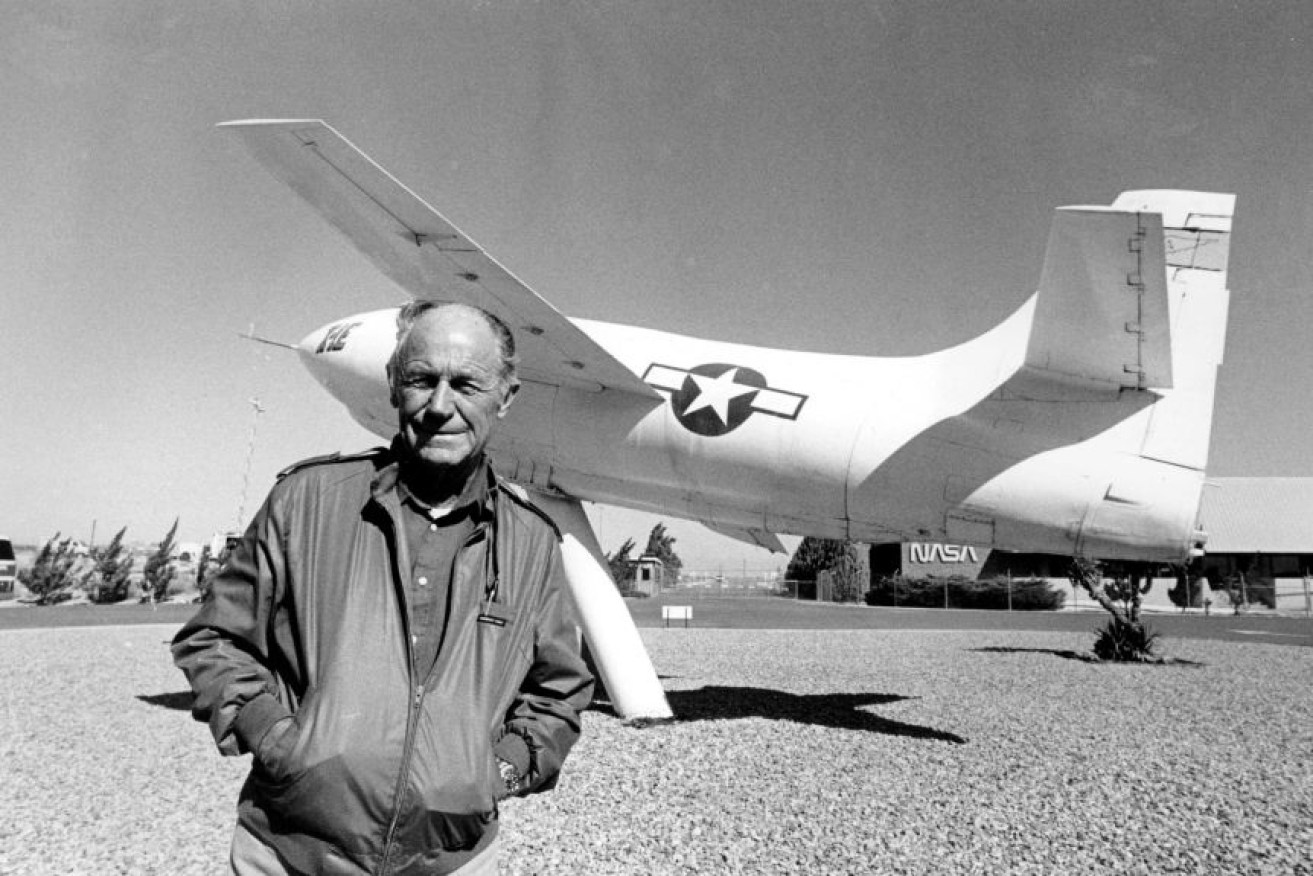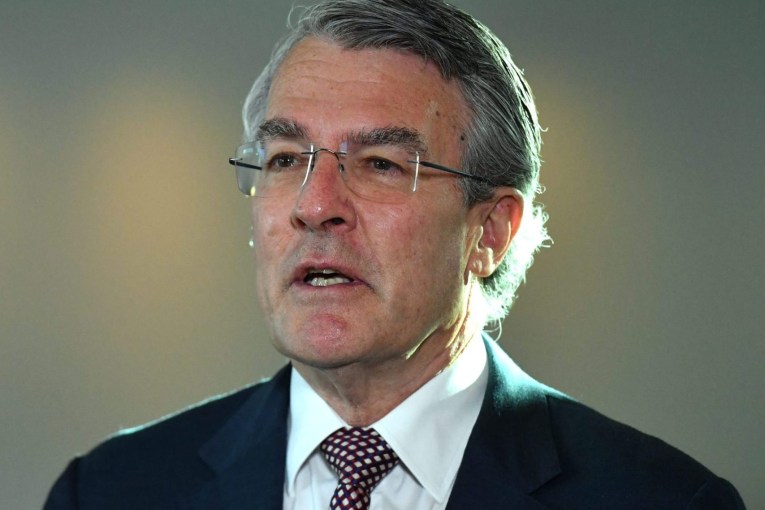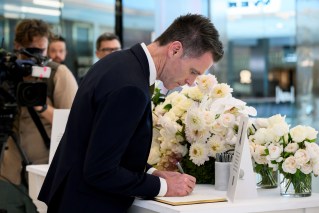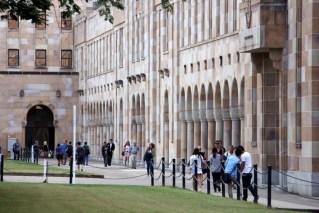Right Stuff: World mourns ‘America’s greatest pilot’ Chuck Yeager
Chuck Yeager, the steely Right Stuff test pilot who took aviation to the doorstep of space by becoming the first person to break the sound barrier more than 70 years ago, has died at the age of 97.

Chuck Yeager pictured with the X1, in which he became the first human to break the sound barrier (ABC photo).
Yeager’s death was announced on his Twitter account by his wife, Victoria.
“It is with profound sorrow I must tell you that my life love General Chuck Yeager passed just before 9:00pm ET [Eastern Time].
“An incredible life well lived, America’s greatest pilot, and a legacy of strength, adventure and patriotism will be remembered forever,” Victoria Yeager said in the tweet.
Fr @VictoriaYeage11 It is w/ profound sorrow, I must tell you that my life love General Chuck Yeager passed just before 9pm ET. An incredible life well lived, America’s greatest Pilot, & a legacy of strength, adventure, & patriotism will be remembered forever.
— Chuck Yeager (@GenChuckYeager) December 8, 2020
Yeager, an unlikely candidate to become one of the most famous aviators in history, joined the US Army Air Corps in 1941 just to work on the engines of aeroplanes, not to fly them.
His first plane ride made him throw up.
He was passed over for the burgeoning US space program because he never went to college but he was hardly heartbroken not to become an astronaut.
He considered them mere passengers “throwing the right switches on instructions from the ground”.
Author Tom Wolfe was so impressed by the mien of the rough-hewn man from Hamlin, West Virginia, that he made Yeager a prominent character in The Right Stuff, his 1979 book about the early days of the space program.
Wolfe said Yeager was blessed with “the right stuff” that made him a legendary test pilot but Yeager said it was more a matter of luck, better-than-average vision and a thorough knowledge of his planes.
Those attributes served him well in World War II.
Flying a P-51 Mustang named Glamorous Glennis in tribute to his girlfriend, Glennis Dickhouse, he was credited with 12 “kills” of German planes — including five in a single dogfight.
After the war he became a test pilot and was assigned to Muroc Air Force Base in California as part of the secret XS-1 project, which had a goal of hitting Mach 1, the speed of sound.
Yeager was a 24-year-old captain, testing out a dozen planes a week, when he first outraced sound on October 14, 1947, in the bright orange Bell X-1 craft.
He had broken two ribs in a horseriding accident a few days before but did not tell his superiors for fear they would ground him.
Because of the pain, he had to use a sawed-off broomstick to close the X-1’s cockpit before take-off.
A B-29 bomber carried the X-1 to 26,000 feet over California’s Mojave Desert before letting it go.
Neither Yeager nor aviation engineers knew if the plane — or the pilot — would be able to handle the unprecedented speed without breaking up.
But Yeager took the 10 metre X-1, powered by liquid oxygen and alcohol rocket engine, to Mach 1.06, about 1,126 kph at 43,000 feet, as if it were a routine flight.
He then calmly brought the craft (which was also named for Glennis, who was by then his wife) gliding down to a dry lake bed, 14 minutes after it had been cut loose on a flight that was a significant step toward space exploration.
Yeager said he had noted a Mach 0.965 reading on his speedometer before it jumped off the scale without a bump.
“I was thunderstruck,” he wrote in his 1985 autobiography Yeager.
“After all the anxiety, breaking the sound barrier turned out to be a perfectly paved speedway.”
Yeager was unfazed by having a job that took him to the brink of death with every outing — such as the 1953 flight on which he safely landed his X-1A after hitting Mach 2.4 and then losing control of the aircraft for 51 seconds.
“It’s your duty to fly the aeroplane,” he told an interviewer. “If you get killed in it, you don’t know anything about it anyway so why worry about it?”
Yeager was born in Myra, West Virginia, on February 13, 1923, one of five siblings.
As a schoolboy, he liked maths and could type 60 words per minute — an indication of the hand-eye coordination that would serve him so well in the cockpit.
Yeager had no interest in aeroplanes as a youth — he did not even see one until he was 18, when he joined the US Army Air Corps to be a mechanic.
After his test pilot heyday, Yeager commanded fighter squadrons and flew 127 combat missions during the Vietnam War.
In the early 1960s, he was in charge of astronaut-style training for Air Force personnel but that program ended when the US Government decided not to militarise space. Still, 26 people trained by Yeager went into orbit as NASA astronauts.
Yeager reached the rank of brigadier general and in 1997 he marked the 50th anniversary of his historic flight by taking an F-15 past the speed of sound.
He then announced that it was his last military flight.
Yeager became something of a social media sensation in 2016 at age 93 when he began fielding questions from the public on Twitter and responding in a curt and sometimes curmudgeonly manner.
When asked what he thought about the moon, he replied: “It’s there.”
Yeager and Glennis, who died of cancer in 1990, had four children.
He married Victoria Scott D’Angelo in 2003.
-ABC












